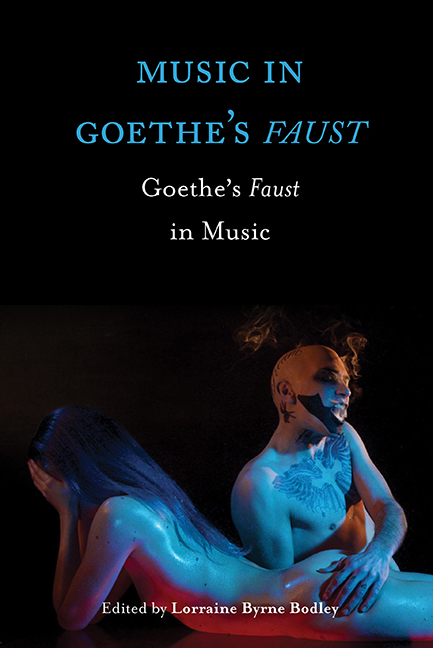Book contents
- Frontmatter
- Dedication
- Contents
- List of Illustrations
- Contributors
- Acknowledgements
- Abbreviations Used in the Notes
- Introduction. Rhapsody and Rebuke: Goethe's Faust in Music
- Part I Goethe's Faust: Content and Context
- Part II Legacies: Goethe's Faust in the Nineteenth Century
- 6 Faust's Schubert: Schubert's Faust
- 7 The Musical Novel as Master-genre: Schumann's Szenen aus Goethes Faust
- 8 The Psychology of Schumann's Faust: Developing the Human Soul
- 9 A Life with Goethe: Wagner's Engagement with Faust in Music and in Words
- 10 Wagner's Ninth: Reading Beethoven with Faust
- 11 Linking Christian and Faustian Utopias: Mahler's Setting of the Schlußszene in his Eighth Symphony
- Part III Topographies: Stagings and Critical Reception
- Part IV New Directions: Recent Productions and Appropriations
- Select Bibliography
- Index
6 - Faust's Schubert: Schubert's Faust
from Part II - Legacies: Goethe's Faust in the Nineteenth Century
Published online by Cambridge University Press: 30 August 2017
- Frontmatter
- Dedication
- Contents
- List of Illustrations
- Contributors
- Acknowledgements
- Abbreviations Used in the Notes
- Introduction. Rhapsody and Rebuke: Goethe's Faust in Music
- Part I Goethe's Faust: Content and Context
- Part II Legacies: Goethe's Faust in the Nineteenth Century
- 6 Faust's Schubert: Schubert's Faust
- 7 The Musical Novel as Master-genre: Schumann's Szenen aus Goethes Faust
- 8 The Psychology of Schumann's Faust: Developing the Human Soul
- 9 A Life with Goethe: Wagner's Engagement with Faust in Music and in Words
- 10 Wagner's Ninth: Reading Beethoven with Faust
- 11 Linking Christian and Faustian Utopias: Mahler's Setting of the Schlußszene in his Eighth Symphony
- Part III Topographies: Stagings and Critical Reception
- Part IV New Directions: Recent Productions and Appropriations
- Select Bibliography
- Index
Summary
For a brief but extraordinarily consequential period from October 1814 to October 1819, Franz Schubert was captivated by the works of Goethe. During that short time span he penned fifty-four of his eventual seventy-two settings of Goethe's poetry. Although those settings represent a variety of genres and draw on a variety of poetic sources, they collectively reveal Schubert's voracious appetite for the work of the poet whose collected works had been released by Cotta's Vienna presses in 1810. Among them the Faust settings have pride of place – not only because they were launched with ‘Gretchen am Spinnrade’ (D 118), the work that is widely considered to have articulated a turning-point in Schubert's approach to song composition and, after it was published in 1821, in the Romantic Lied as a genre, but also because of their deployment of extraordinary musical means to achieve, collectively, unprecedented psychological and dramatic insight into the work that Friedrich Schelling had described as ‘die innerste, reinste Essenz unseres Zeitalters’ [the inmost, purest essence of our age]. As shown in Table 6.1, between October 1814 and May 1817 Schubert completed four settings of texts from that drama and began a fifth. Those four completed settings are the subject of this essay.
Schubert was of course hardly alone in his fascination with the Faust saga. It had been wildly popular since the mid-sixteenth century, when the deeds of one or both of the historical Fausts were first compiled in manuscript by Christoph Rosshirt ca. 1575 and then published (with additions) in a chapbook published in Frankfurt am Main by Johann Spiess in 1587. During the first century and a half after the chapbook's appearance Faust's ill repute spread rapidly, quickly losing its original specifically Protestant moral and becoming a pan-denominational craze in Catholic Europe as well. A new twist was added with the versions that appeared during the late Enlightenment, as those recountings, drawing in part on the commonly encountered interminglings of the Faust and Don Juan legends, frequently introduced what might today be termed a ‘love interest’: now Faust's long-fabled seduction of a conjured Helen of Troy was supplemented or replaced by his reputed wooing of innocent young girls who fell in love beyond their station in life, became pregnant, and often resorted to infanticide.
- Type
- Chapter
- Information
- Music in Goethe's FaustGoethe's Faust in Music, pp. 101 - 116Publisher: Boydell & BrewerPrint publication year: 2017

